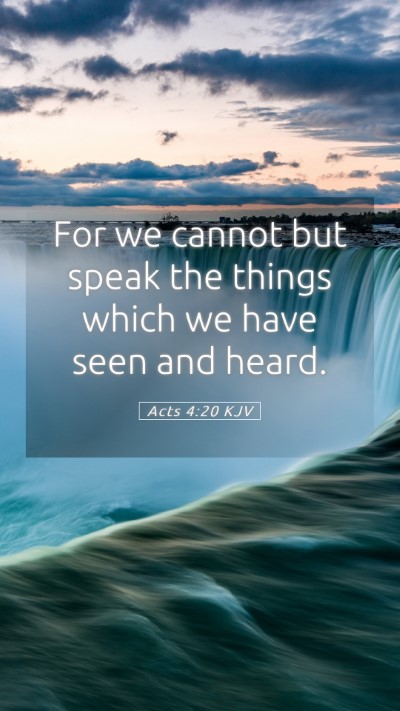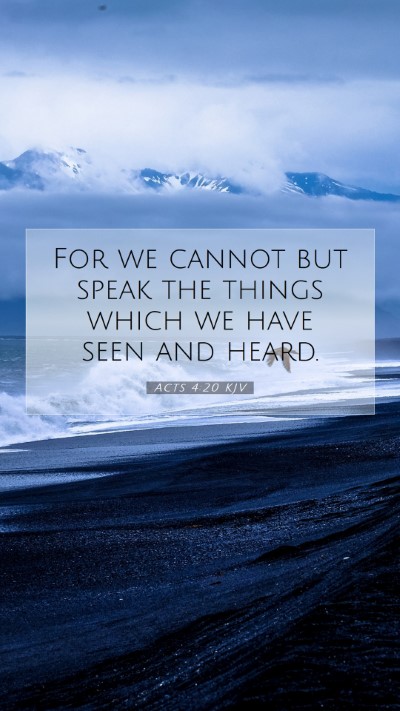Understanding Acts 4:20
Acts 4:20 states, "For we cannot but speak the things which we have seen and heard." This verse records the response of Peter and John when they were commanded by the religious leaders to stop preaching about Jesus. The context surrounding this declaration is crucial for a deeper understanding, as it encapsulates the boldness and commitment of the apostles to their mission.
Contextual Background
In Acts chapter 4, Peter and John had just healed a man who was lame from birth, an act that drew significant attention. Following this miracle, they preached to the people about Jesus, leading to their arrest by the Jewish authorities. After being interrogated, they were threatened and told to cease their teachings. Peter and John's subsequent reply, as captured in Acts 4:20, demonstrates their unwavering dedication to spreading the Gospel, regardless of external pressures.
Verse Meaning and Commentary
- Matthew Henry's Commentary: Henry emphasizes the apostles' conviction and courage. He notes that despite the threats, their obligation to share the transformative experiences they had encountered with Christ compelled them. He views this as a foundational example of apostolic zeal.
- Albert Barnes’ Commentary: Barnes highlights the internal necessity felt by the apostles in sharing their experiences. He suggests this compulsion arises from the profound truth and authority of their encounters with Jesus. For Barnes, this stance forms a pattern for believers regarding the importance of witness in faith.
- Adam Clarke's Commentary: Clarke emphasizes the apostolic understanding of their divine calling. He argues that the imperatives given by God supersede human authority. Clarke explains that for the apostles, silence about their faith was not an option, as they were driven by the imperative to proclaim the Gospel.
Bible Verse Interpretations
Acts 4:20 serves as a powerful testament to the nature of evangelism. The apostles express a principle that resonates with many believers today: witnessing for Christ is not merely an optional action but a deep-rooted response to divine revelation and grace. Their lives were transformed, and they could not, in good conscience, remain silent about it.
Application of the Verse
The application of Acts 4:20 extends into the lives of contemporary Christians. It prompts reflection on personal experiences with faith:
- Personal Witness: Believers are encouraged to share their testimonies of faith and the personal change they have experienced as a result of their relationship with Christ.
- Courage in Adversity: Like Peter and John, Christians today are challenged to maintain boldness in the face of opposition or societal pressure to conform.
- Community Engagement: The verse encourages active participation in community discussions about faith, particularly in hostile environments that may discourage open dialogue about religion.
Significance of the Verse
Acts 4:20 is significant not only as a literary element of the New Testament but as a theological anchor for understanding evangelistic duty. It reveals that true faith manifests itself in actions—specifically, the willingness to speak out for the truths observed and heard in Christ. This stance can fuel both individual and communal faith practices leading to effective outreach.
Cross References
- Matthew 10:20 - Jesus assures His followers that they will be given words to speak when challenged.
- Acts 1:8 - The call to be witnesses in all parts of the earth, explaining the global mission of the apostles.
- 1 Peter 3:15 - An encouragement for believers to always be ready to share their faith with gentleness and respect.
Conclusion
In summary, Acts 4:20 encapsulates a universal truth for all believers: our experiences with Christ compel us to share His message. Whether in personal conversations or broader community engagement, the response to God's moving in our lives should be to proclaim His works. As we navigate our faith journeys, we should reflect on how we can embody this spirit of witness in our own lives, ensuring our speech aligns with the transformative power of Christ’s love and truth.


